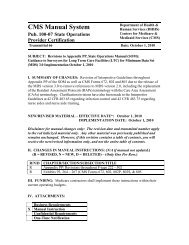LOUISIANA Community Mental Health Services Block Grant ...
LOUISIANA Community Mental Health Services Block Grant ...
LOUISIANA Community Mental Health Services Block Grant ...
You also want an ePaper? Increase the reach of your titles
YUMPU automatically turns print PDFs into web optimized ePapers that Google loves.
Cornerstone Quality Management Initiative<br />
Previous administrations initiated the Cornerstone Project in 2005, as a way of developing and<br />
implementing the infrastructure necessary to move forward with redesigning mental health services<br />
and to address more contemporary service delivery utilization management needs. The four<br />
„Cornerstones‟ listed below continue to provide the overall framework and processes for operations<br />
of the system of care and continue to develop to the present.<br />
Recovery and Resiliency Cornerstone: Under the Cornerstone initiative, the Office of <strong>Mental</strong> <strong>Health</strong><br />
has embraced a recovery and resiliency philosophy of care. Over the past few years, OBH<br />
conducted extensive staff training in this philosophy of care and has also sent staff to observe<br />
programs in other states that have exemplary programs. A major focus of the activities under this<br />
Cornerstone this past year has been further development of peer support services statewide and and<br />
pursuit of efforts to obtain Medicaid funding for these services. Over ?40? Peer Support Specialists<br />
were trained, certified, and are now working within the outpatient clinics of the system. The Local<br />
Governing Entities (LGEs) and the OBH clinics employ these certified Peer Support Specialists as<br />
support staff to assist consumers who arrive for their regular clinic appointments. Employment of<br />
certified peer support specialists significantly advances the recocery/ resiliency philosophy of care.<br />
However, it is noteworthy that the viability of this program has been severely affected by the budget<br />
cuts, and the future of the program is uncertain at this time.<br />
Utilization Management Cornerstone: OBH operates a strong utilization management (UM) system<br />
for the OBH clinics and for those LGEs who wish to participate, and this has become a focus of<br />
current mental health re-design efforts discussed previously. This UM system assures that OBH is<br />
serving persons most in need and assures that persons served receive the right type and amount of<br />
services based on their level of need. OBH has established standardized target population definitions<br />
for service eligibility criteria, service definitions, client profiles, intensity of need criteria, electronic<br />
centralized scheduling, service priority determination, authorization criteria, and service packages as<br />
part of a robust UM system. Productivity standards for service delivery staff have been defined<br />
according to UM standards and are monitored. To assist clinics to use the productivity data to make<br />
data-based decisions for their clinics, OBH utilizes the on-line analytical system, Service Process<br />
Quality Management (SPQM), and monthly staff webinars with David Lloyd, a national accountable<br />
care expert. The current focus has been on service productivity management and improvement and<br />
utilization of Level of Care Utilization System (LOCUS) ratings to determine and assign level of<br />
service (e.g., assign client to medication management clinics vs. specialty service clinics). This is a<br />
major focus of the mental health redesign initiative described in another section of this plan.<br />
All OBH clinics have completed a UM Readiness Survey and a UM Implementation plan, and are<br />
now in the implementation phase of the UM / Accountable Care process. The UM process is under<br />
the direction of the Central Office Division Director for Policy, Standards, and Quality Assurance.<br />
There are UM teams in each OBH Region and a statewide UM committee., The UM Central Office<br />
Director conducts monthly webinars with the Committee and provides ongoing technical assistance<br />
where needed to support the continued implementation of UM / Accountable Care. The UM team is<br />
currently monitoring the implementation of the mental health re-design initiative and the status of the<br />
new service components of access to care, medication management, and specialty clinics.<br />
Credentialing and Privileging Cornerstone: In addition to the traditional credentialing model that has<br />
been utilized in the state psychiatric hospitals, a credentialing plan and competency assessment<br />
PART C <strong>LOUISIANA</strong> FY 2011 PAGE 65<br />
SECTION II: ADULT & CHILD/ YOUTH<br />
IDENTIFICATION & ANALYSIS OF SERVICE SYSTEM’S STRENGTHS, NEEDS, & PRIORITIES
















